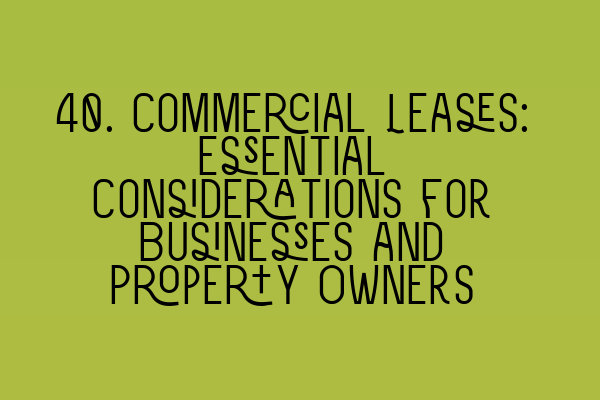40. Commercial Leases: Essential Considerations for Businesses and Property Owners
When it comes to commercial leases, there are several essential considerations for businesses and property owners to keep in mind. A commercial lease is a legally binding contract that governs the terms and conditions of renting a commercial property. Whether you are a business owner looking for a space to operate, or a property owner looking to lease out your premises, understanding these considerations will help ensure a smooth and successful leasing process.
1. Location
The location of your commercial property is crucial for the success of your business. It is important to choose a location that is easily accessible for your target customers and has high visibility. Consider factors such as proximity to transportation links, parking facilities, and the surrounding businesses that can attract foot traffic. Conduct thorough market research to determine the ideal location for your business needs.
For property owners, a prime location can attract high-quality tenants and ensure a steady stream of rental income. Consider the demand for commercial properties in the area and assess the potential rental value of your property.
2. Rental Rates and Terms
The rental rates and terms of a commercial lease are critical for both parties involved. As a business owner, carefully review the rental rates and assess whether they align with your budget. Negotiate and clarify any additional charges such as maintenance fees, insurance premiums, or utilities that may be applicable.
For property owners, it is important to evaluate the rental rates in the market and set competitive prices. Consider factors such as the condition and location of the property, as well as the demand and supply dynamics in the area. Seek professional advice to ensure you are charging a fair and market-driven rental rate.
3. Lease Duration
The lease duration is an essential consideration for both parties. As a business owner, evaluate your long-term plans and consider whether the lease duration aligns with your goals and growth projections. A long-term lease can provide stability, while a shorter lease may offer more flexibility.
For property owners, it is important to strike a balance between offering shorter lease durations for flexibility and longer lease durations for stability. Evaluate the demand and supply dynamics in the market and consider the preferences of potential tenants.
4. Permitted Use and Alterations
The permitted use clause specifies the type of activities that can be conducted on the commercial property. It is crucial to ensure that the permitted use aligns with your business requirements. Understand any restrictions imposed by the lease agreement or zoning regulations that may affect your ability to operate certain types of businesses.
For property owners, define the permitted use carefully to ensure that the tenant operates within the agreed-upon parameters. This clause prevents the tenant from using the property for activities that may be disruptive or against the law.
The alterations clause outlines whether tenants are allowed to make any changes or modifications to the property. As a business owner, determine whether you require the flexibility to alter the space to meet your specific needs. Property owners should clearly define the permitted alterations and have procedures in place to ensure any modifications comply with legal requirements.
5. Repairs and Maintenance
The responsibility for repairs and maintenance should be clearly outlined in a commercial lease. As a business owner, understand your obligations and assess whether the property is in good condition before signing the lease. Discuss any existing damages or maintenance issues with the property owner to ensure they are addressed adequately.
For property owners, clearly define the responsibilities of the tenant for repairs and maintenance. Additionally, establish a procedure for reporting and addressing any damages or maintenance issues that may arise during the lease term.
6. Termination and Renewal
The termination and renewal clauses in a commercial lease are crucial for both parties. As a business owner, review the termination conditions to understand your options if you need to end the lease early. Evaluate the renewal terms to ensure you have the opportunity to extend the lease if needed.
For property owners, consider the termination and renewal clauses carefully. Determine the notice periods required for termination, as well as the conditions for renewal such as rental adjustments or lease term changes. Having a clear understanding of these clauses will help you plan for the future and avoid any disputes.
7. Legal Advice
Commercial leases can be complex legal documents, and it is always recommended to seek professional legal advice before signing any agreement. A solicitor with expertise in property law can review the lease, highlight any potential pitfalls, and ensure that your interests are protected.
At SQE Property Law & Land Law, we have a team of experienced solicitors who can provide expert advice and guidance on commercial leases. Our SQE 1 Practice Exam Questions and SQE 1 Practice Mocks FLK1 FLK2 resources can help you prepare for the SRA SQE exam if you are pursuing a career in property law. We also offer SQE 2 Preparation Courses and SQE 1 Preparation Courses to help you succeed in your legal studies.
If you are a business owner or property owner in need of legal assistance or guidance regarding commercial leases, don’t hesitate to contact us. We are here to help you navigate the complexities of property law and ensure a successful lease agreement.
For more information, please visit our website and check out our SRA SQE Exam Dates for upcoming exams. Take the necessary steps to protect your interests and make informed decisions when it comes to commercial leases.
